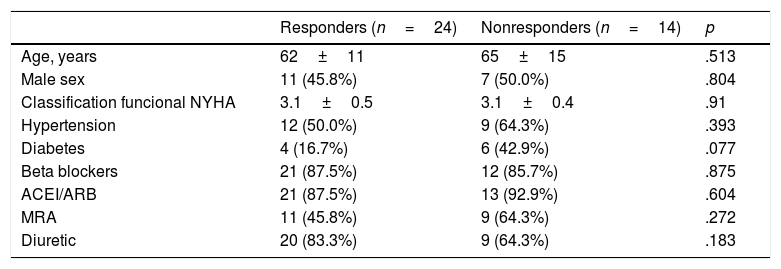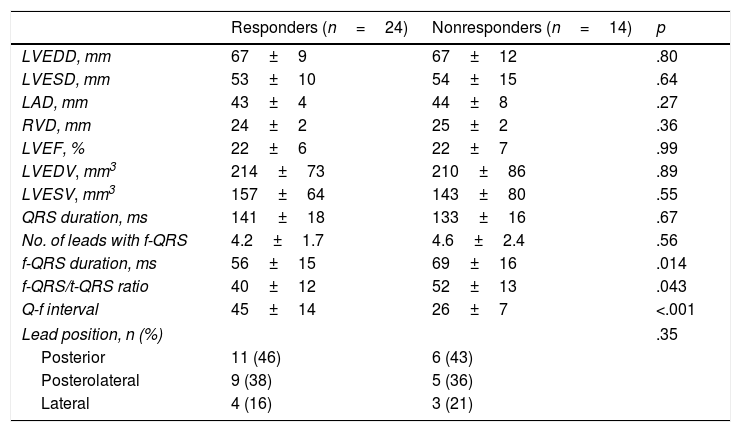Cardiac resynchronization therapy (CRT) is an effective option in the treatment of patients with heart failure and wide QRS. Presence of fragmented QRS (f-QRS) on 12-lead electrocardiogram (ECG) has been shown to be associated with non-response to CRT. The aim of this study was to evaluate whether onset of fragmentation (Q-f interval) is important for CRT response.
MethodsThis is a single-center retrospective analysis of prospectively collected data of 38 non-ischemic dilated cardiomyopathy patients (18 men, mean age 63±12 years) with f-QRS on 12-lead ECG who underwent CRT. Duration of fragmentation, ratio of f-QRS duration to the total QRS duration (f-QRS/t-QRS ratio) and time interval from Q wave to the onset of QRS fragmentation (Q-f interval) were measured.
ResultsThe baseline clinical, echocardiographic findings of patients with responders (24 patients, 63%) and non-responders showed no statistically significant difference, except for longer f-QRS duration, increased ratio of f-QRS duration to the total QRS duration (f-QRS/t-QRS ratio) and shorter time interval from Q wave to the onset of QRS fragmentation (Q-f interval) in patients not responding to CRT. In multivariate analysis, Q-f interval was determined as an independent predictor of response to CRT (OR 1.240, 95% CI: 1.049–1.467, p=.012). In ROC curve analysis, the best cut-off value for Q-f interval to predict responders was 32.5ms with a sensitivity and specificity of 83.3% and 85.7%, respectively (AUC 0.899, 95% CI: 0.797–1.000, p=.001).
ConclusionsShorter time from onset of QRS to beginning of fragmentation is a simple ECG marker to predict non-responsive patients to CRT.
La terapia de resincronización cardíaca (TRC) es una opción eficaz en el tratamiento de los pacientes con insuficiencia cardíaca y QRS ancho. Se ha demostrado que la presencia de un QRS fragmentado (QRS-f) en el electrocardiograma (ECG) de 12 derivaciones se asocia con una no respuesta a la TRC. El objetivo de este estudio es valorar si la aparición de la fragmentación (intervalo Q-f) es importante en la respuesta a la TRC.
MétodosAnálisis retrospectivo de centro único de datos recogidos de manera prospectiva procedentes de 38 pacientes con miocardiopatía isquémica dilatada (18 hombres, media de edad de 63±12 años) sometidos a TRC con un QRS-f en ECG de 12 derivaciones. Se midieron la duración de la fragmentación, la relación duración del QRS-f/duración total del QRS (QRS-f/QRS-t) y el intervalo de tiempo transcurrido desde la aparición de la onda Q hasta el inicio de la fragmentación del QRS.
ResultadosNo se observaron diferencias estadísticamente significativas entre los pacientes respondedores (24 pacientes, 63%) y los no respondedores en cuanto a las características clínicas iniciales y los hallazgos electrocardiográficos. No obstante, en pacientes no respondedores a la TRC, se observó una mayor duración del QRS-f, una proporción QRS-f/QRS-t aumentada y un intervalo Q-f más breve. En el análisis multivariante, se estableció el intervalo Q-f como un predictor independiente de respuesta a la TRC (OR 1,240; IC 95%: 1,049-1,467; p=0,012). En el análisis de curva ROC, el valor de corte para el intervalo Q-f por lo que se refiere a la predicción de respondedores fue 32,5ms, con una sensibilidad y especificidad del 83,3 y 85,7%, respectivamente (AUC 0,899, IC 95%: 0,797-1,000; p=0,001).
ConclusionesUn intervalo de tiempo breve entre el inicio de QRS y el inicio de la fragmentación es un marcador ECG sencillo para la predicción de pacientes no respondedores a la TRC.
Article
Diríjase desde aquí a la web de la >>>FESEMI<<< e inicie sesión mediante el formulario que se encuentra en la barra superior, pulsando sobre el candado.

Una vez autentificado, en la misma web de FESEMI, en el menú superior, elija la opción deseada.

>>>FESEMI<<<












